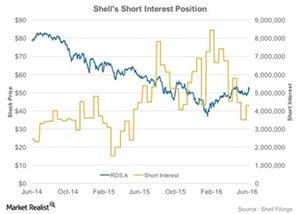What Does a Fall in Shell’s Short Interest Mean?
Shell has witnessed a 49% fall in its short interest volumes since February 10, 2016. This indicates that the bearish sentiment for the stock is weakening.
July 4 2016, Updated 1:04 a.m. ET

Shell’s short interest is falling
Royal Dutch Shell (RDS.A) has witnessed a 49% fall in its short interest volumes since February 10, 2016. This indicates that the bearish sentiment for the stock is weakening.
This is likely due to the fact that crude oil prices have risen steeply—a positive sign for the integrated energy sector—after touching multiyear lows at the beginning of 2016. During the same period, Shell’s stock price rose by 21%.
In the same period, Shell’s peers ExxonMobil (XOM), YPF (YPF), and Statoil (STO) have witnessed falls of 12%, 54%, and 43%, respectively, in their short interests and rises of 14%, 38%, and 29%, respectively, in their stock prices.
If you’re looking for exposure to the integrated energy sector, you can consider the iShares North American Natural Resources ETF (IGE). The ETF has ~21% exposure to the sector.
